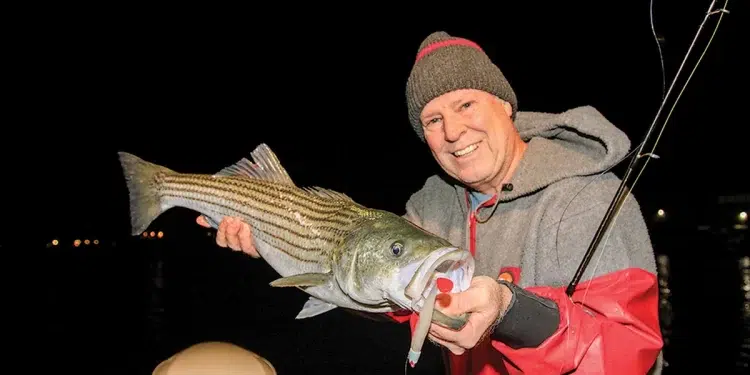Big fish and fast action await those who probe the thin line between dark and light this month.
Drifting along the edge of a shadow line created by a light at the end of a small L-shaped wooden dock, I watched carefully for signs of life. Silversides were dimpling the surface on this calm and quiet late-night expedition. Occasionally, I could hear the slap of bunker further out in the darkness. With nobody on the dock, things seemed perfect for working up some big fish—and they were.
Up ahead, in the soft edge where the light was fading into darker water, I could make out the shadows of three solid stripers holding effortlessly in place against the current. It took but a single cast with a 5-inch soft-plastic jerkbait for the teen-sized lead bass to break formation. With a push of her tail, she slid six inches into the light to intercept my offering and immediately eased back into the safety of the dark side. I knew she was mine before I set the hook.
I love fishing shadow lines any time of the year. Despite the late hours and need for absolute stealth with this approach, there’s just something about the eerie solitude, chance to intercept big fish, and challenge of being precise in both approach and presentation that really gets my heart pumping. Many anglers fish shadow edges during the heat of summer, but I love to hit them earlier in the season. The weeks immediately preceding the official start of summer have long been my sweet spot.
It’s amazing how many predator species spend time lurking in the shadows. In southern waters, snook, tarpon, jacks, and sea trout all make appearances, as will an occasional redfish and large shark. In the mid-Atlantic and Northeast regions, striped bass are the usual target, but weakfish and blues are also willing combatants.
It’s no wonder predators love shadow lines. For one thing, they are generally found close to structure since a light source is needed to create these borders. Hiding in the shadows, anywhere from a few inches to several yards from lighted water, predators get a good look at all the baitfish options on the menu ranging from silversides, sand eels, and pilchards to squid, menhaden, mullet, shrimp, crabs, sea worms, and the like. Especially vulnerable are creatures that skirt the edge of the darkness themselves. Silhouetted by light above, they become easy targets for predators that barely have to reveal their presence to grab a meal.
Just about any light source can attract and hold bait and predators after dark, but some hold the fish better than others. Sources shining on an area of moderate current are often favored as the ability of baitfish to control their movement is somewhat compromised while the current presents little challenge to larger fish. Also, old-style incandescent lights seem to illuminate a smaller area which better concentrates the baitfish, and thus the predators.
Subscribe Here For More Fishing Content
LED lighting and pink lighting, by comparison, light up larger areas with less intensity, penetration below the surface and urgency for predators to react quickly or miss a meal. Subaqueous green or blue lighting can hold fish in relatively tight pockets, too, but I still like the incandescent lights best when I can find them.
As mentioned, stealth is an important aspect of this quest. Putter in slowly, drift with the current and parallel to the shadow line, or use a trolling motor with spot-lock capability to hold your position slightly up-current from the strike zone. Keep the conversation quiet and avoid dragging things like coolers across the deck. Should you catch a large fish that makes a ruckus, allow a few minutes for things to settle down again before making another cast.
Of course, this is night fishing, so know your waters. Before trying a new dock or bridge area you’ve spotted, it’s a smart idea to check it out in the daytime first.
Lastly, if targeting shadow lines behind homes, businesses, or any place that is not public property, fish with decorum. It doesn’t take much to cause landowners to simply flip the switch and put an end to the action at your newfound honey hole.
-by Tom Schlichter















